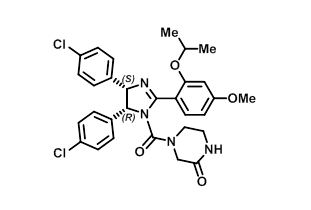MDM2 inhibitor (-)-Nutlin 3a Small Molecule (Tool Compound)
Invented by Prof Bernard Golding from University of Newcastle upon Tyne
Invented at
- Datasheet
- References (4)
- Inventor Info
Info
| Antigen/Gene or Protein Targets | MDM2/p53 |
| Synonyms |
(-)-4-[4,5-Bis(4-chlorophenyl)-2-(2-isopropoxy-4-methoxyphenyl)-4,5-dihydro-1H-imidazole-1-carbonyl]piperazin-2-one CAS No.: 675576-98-4 |
| Type | Inhibitor |
| Relevance | MDM2 inhibitor (-)-Nutlin 3a is a wild-type p53 activator which acts by binding and inhibiting MDM2. Loss of p53 activity, by deletion, mutation, or MDM2 overexpression, is the most common event in the development and progression of cancer, while the restoration of endogenous p53 function results in tumor regression in vivo. In this context, the rescue of the impaired p53 activity and resensitization to apoptosis in cancer cells by disrupting the MDM2−p53 interaction offers an opportunity for anticancer therapeutics. |
| On Target IC50 | 90 nM |
| Selectivity | Much lower effect on MDMX. Most effective on tumors with wild type p53. |
| Molecular Formula | C30H30Cl2N4O4 |
| Molecular Weight (g/mol) | 581.49 |
| In vivo applications | Nutlin-3a suppresses xenograft growth in a dose-dependent fashion with the highest dose (200 mg/kg) showing a substantial tumor shrinkage. Nutlin-3 is a selective activator of the p53 pathway in vivo and highly efficacious against SJSA-1 osteosarcoma tumors. Tumors with wild-type p53 and mdm2 gene amplification will respond best to therapy with Nutlin-3a. |
| In vitro applications | Nutlin-3a displaces p53 from the binding pocket of MDM2 and thereby releases p53 from inhibition and proteasomal degradation, leading to induction of its downstream targets, cell cycle arrest, and apoptosis. Seven days of incubation with 10 μM nutlin-3a led to >90% inhibition of NIH3T3 cells’ growth. Nutlin-3a stabilizes and activates p53, and induces p21 expression in a dose-dependent manner. Nutlin-3a effectively depletes the S-phase compartment to 0.2-2% and increases the G1- and G2/M-phase compartments. Nutlin-3a induces apoptosis in ~60% of SJSA-1 and MHM cells after 40 h, which increased further after 60 h (85% and 65%, respectively) |
| Research Area | Cancer, Cell Cycle, Epigenetics & Nuclear Signalling |
References: 4 entries
Bertamino et al. 2013. J Med Chem. 56(13):5407-21. PMID: 23802716.
Synthesis, in vitro, and in cell studies of a new series of [indoline-3,2'-thiazolidine]-based p53 modulators.
Europe PMC ID: 23802716
Vassilev et al. 2004. Science. 303(5659):844-8. PMID: 14704432.
In vivo activation of the p53 pathway by small-molecule antagonists of MDM2.
Europe PMC ID: 14704432
Add a reference
References: 4 entries
Bertamino et al. 2013. J Med Chem. 56(13):5407-21. PMID: 23802716.
Synthesis, in vitro, and in cell studies of a new series of [indoline-3,2'-thiazolidine]-based p53 modulators.
Vassilev et al. 2004. Science. 303(5659):844-8. PMID: 14704432.
In vivo activation of the p53 pathway by small-molecule antagonists of MDM2.
Add a reference





